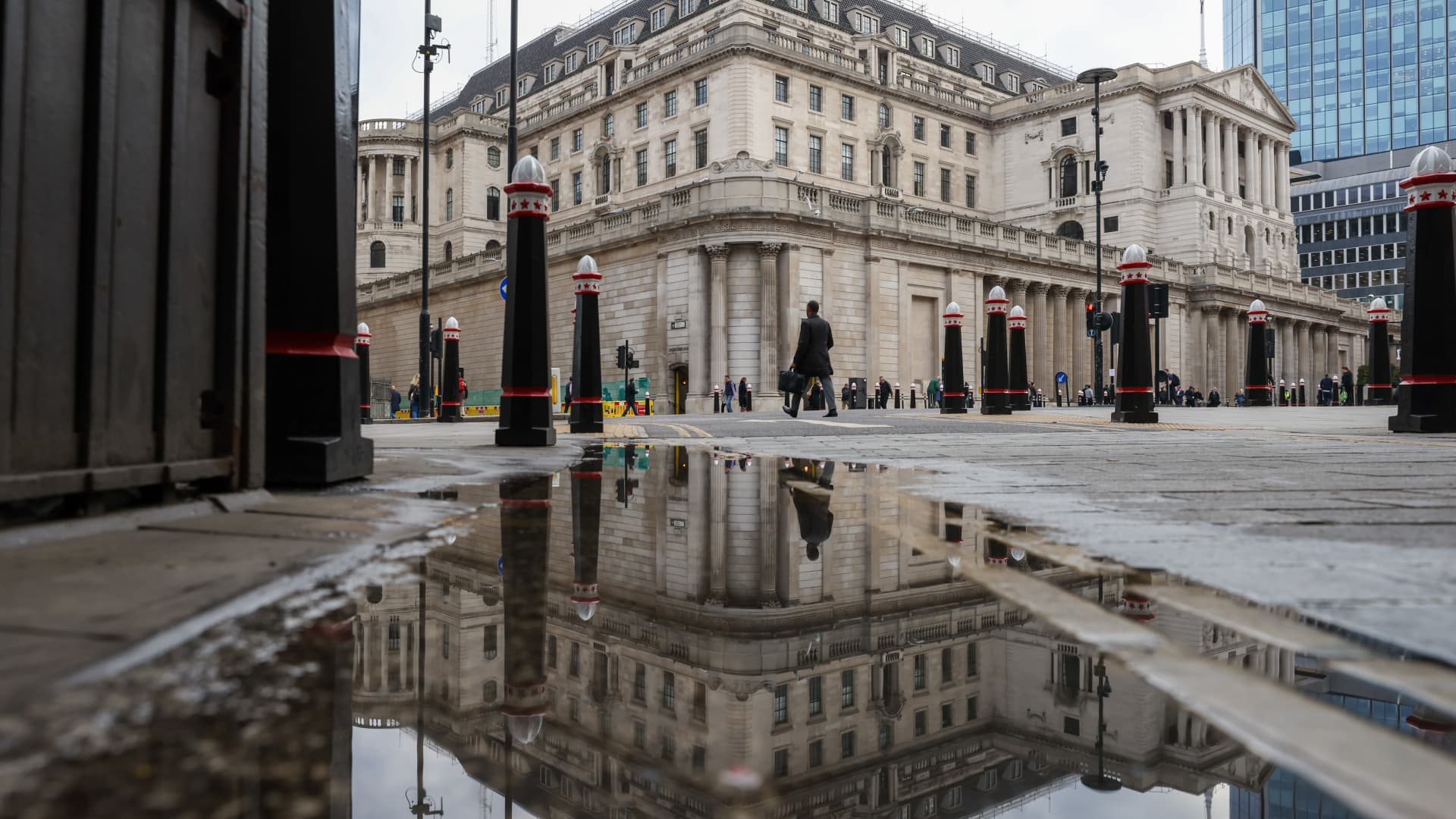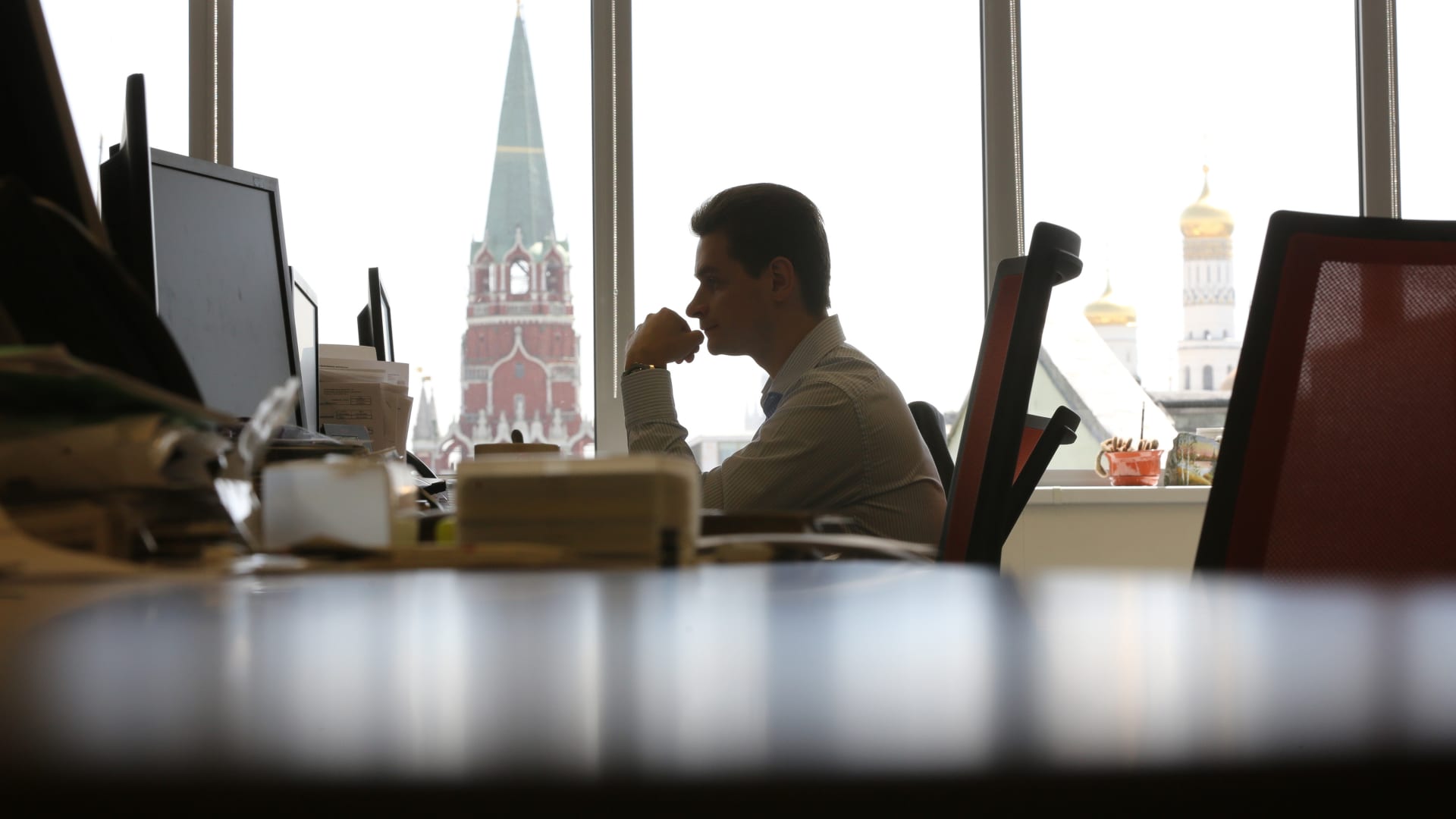Bank of England launches biggest interest rate hike in 27 years, predicts lengthy recession
The Bank of England on Thursday hiked interest rates by 50 basis points, its largest single increase since 1995, as it tries to rein in runaway inflation.

LONDON — The Bank of England on Thursday hiked interest rates by 50 basis points, its largest single increase since 1995, and projected the U.K.'s longest recession since the global financial crisis.
The sixth consecutive increase takes borrowing costs to 1.75% and marks the first half-point hike since the bank was made independent from the British government in 1997.
The Monetary Policy Committee voted by a majority of 8-1 in favor of the historic half-point rise, and cited climbing inflationary pressures in the U.K. and the rest of Europe since its previous meeting in May.
"That largely reflects a near doubling in wholesale gas prices since May, owing to Russia's restriction of gas supplies to Europe and the risk of further curbs," the MPC said in its accompanying statement.
"As this feeds through to retail energy prices, it will exacerbate the fall in real incomes for UK households and further increase UK CPI inflation in the near term."
Britain's energy regulator, Ofgem, increased the energy price cap by 54% from April to accommodate soaring global costs, but is expected to rise by a greater degree in October, with annual household energy bills predicted to surpass £3,600 ($4,396).
The bank now expects headline inflation to peak at 13.3% in October and to remain at elevated levels throughout much of 2023, before falling to its 2% target in 2025.
The MPC noted that the labor market remains tight, with domestic cost and price pressures elevated, adding that there is a risk that a "longer period of externally generated price inflation will lead to more enduring domestic price and wage pressures."
"The labour market has remained tight, with the unemployment rate at 3.8% in the three months to May and vacancies at historically high levels," the MPC said. "As a result, and consistent with the latest Agents' survey, underlying nominal wage growth is expected to be higher than in the May Report over the first half of the forecast period."
Sterling was down over 0.5% against the dollar following the bank's announcement, trading at around $1.209, while the FTSE 100 index climbed 0.5%.
Cost-of-living crisis
In a news conference following the announcement, Bank of England Governor Andrew Bailey said the shock of Russia's war in Ukraine is now the largest contributor to U.K. inflation "by some way."
"There is an economic cost to the war, but I have to be clear, it will not deflect us from setting monetary policy to bring inflation back to the 2% target," he added.
Markets had broadly priced in the more aggressive approach at the August meeting, after U.K. inflation hit a new 40-year high of 9.4% in June as food and energy prices continued to surge, deepening the country's historic cost-of-living crisis.
Bailey vowed last month that there would be "no ifs or buts" in the central bank's commitment to returning inflation toward its 2% target.
The Bank is simultaneously forecasting a long recession starting later this year and an even higher peak in inflation. This is a toxic economic combination, which would be difficult for the central bank to navigate at the best of times, let alone when it is increasingly being dragged into the political spotlight.
Luke Bartholomew
Senior Economist, Abrdn
Analysts had been keen to assess the bank's language, particularly its previous commitment to act "forcefully" on inflation, and the MPC retained that language in Thursday's report.
"I recognize the significant impact this will have, and how difficult the cost-of-living challenge will continue to be for many people in the United Kingdom," Bailey said.
"Inflation hits the least well-off hardest, but if we don't act to prevent inflation becoming persistent, the consequences later will be worse, and that will require larger increases in interest rates."
The bank said that it intends to start active government bond sales worth approximately £10 billion ($12.1 billion) per quarter from September, subject to a final green light from policymakers.
Recession incoming
The bank issued a dire outlook for economic growth, suggesting that the latest gas price rise has led to another "significant deterioration" in the outlook for activity in the U.K. and the rest of Europe.
The MPC now projects that the U.K. will enter recession from the fourth quarter of 2022, and that the recession will last five quarters as real household post-tax income falls sharply in 2022 and 2023 and consumption begins to contract.
"Growth thereafter is very weak by historic standards. The contraction in output and weak growth outlook beyond that predominantly reflect the significant adverse impact of the sharp rises in global energy and tradable goods prices on U.K. household real incomes," the MPC said in its monetary policy report.
The forecast warns of a peak-to-trough fall in output of 2.1%, with the economy beginning to shrink in the fourth quarter of 2022 and contracting throughout 2023.
BOE Governor Andrew Bailey has warned the Bank is walking a "narrow path" between growth and inflation.
Bloomberg | Bloomberg | Getty Images
Luke Bartholomew, senior economist at Abrdn, said the bank's forecasts make clear just how difficult the U.K.'s economic picture is compared with other major countries.
"The Bank is simultaneously forecasting a long recession starting later this year and an even higher peak in inflation. This is a toxic economic combination, which would be difficult for the central bank to navigate at the best of times, let alone when it is increasingly being dragged into the political spotlight," he said.
Liz Truss, the favorite to win the Conservative Party leadership contest and succeed Boris Johnson as prime minister, is reportedly considering a review of the Bank of England's inflation mandate and the extent of its independence from the central government.
"With inflation now expected to stick around for longer, it is hard to see how the Bank can pivot towards supporting the economy any time sooner. As such, investors should expect further interest rate increases from here even as markets and the economy struggle," Bartholomew added.

 ShanonG
ShanonG 
































